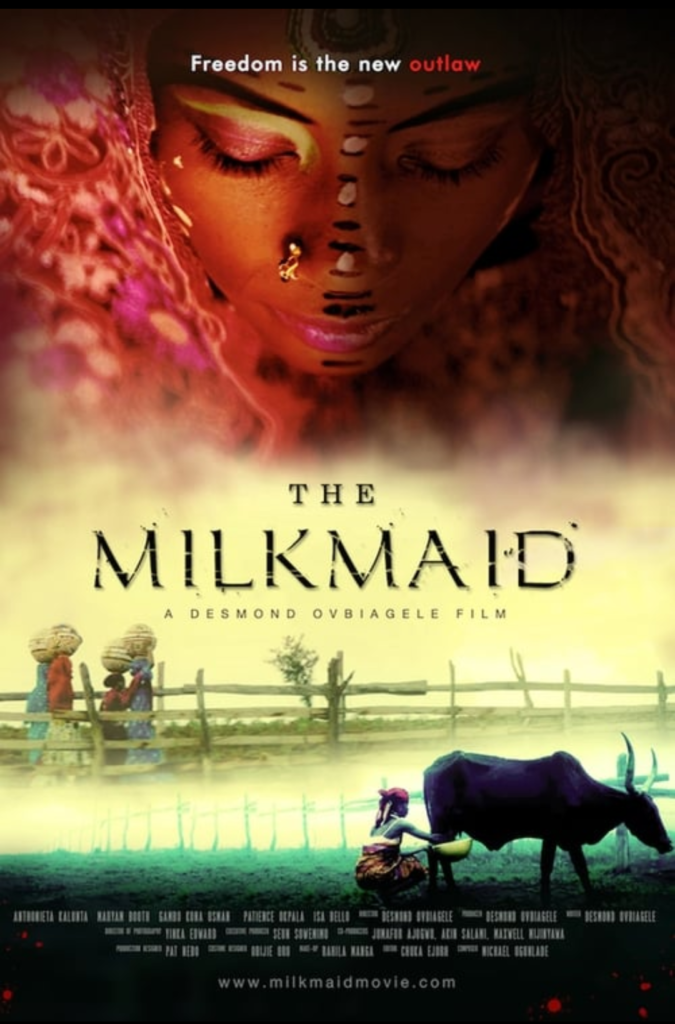When I learnt Nigeria was submitting a movie for the 2019 Oscars International Feature Film (IFF) category, I was beyond psyched as this was the second consecutive time, the first being Lionheart (2018). I assumed being Oscar-ready meant we were growing and that is true. However, after a second watch of The Milkmaid, I began to question our reasons for choosing The Milkmaid, an ambitious movie that drags in runtime and execution.
 ‘Anikulapo’ Review: Kunle Afolayan Thrills Viewers with New Epic
‘Anikulapo’ Review: Kunle Afolayan Thrills Viewers with New Epic

Written, produced and directed by Desmond Ovbiagele (Render to Caesar), The Milkmaid follows the story of Aisha (Anthonieta Kalunta) on a quest to find her kidnapped sister, Zainab (Maryam Booth), in an insurgency-ravaged region in the North. The film brilliantly uses flashbacks and recollections to tell how they came to be separated in the first instance, and the mountains she moves to be with Zainab. By the time they are reconnected, our narrator, Aisha, who is also the main character, is very much present in these scenes.
The Milkmaid is a very complex film that explores a lot of themes around the insurgency in the North, but the quest to find Zainab stands out the most, although sometimes we forget about this as we are not really convinced that is what Aisha wants. Other themes The Milkmaid explores are the false pretentiousness of insurgents, the hierarchy and leadership of terrorist groups, underage marriage, dowries and bride price.
Over the 2-hour plus runtime of The Milkmaid, the intentions and obstacles of Aisha keep changing. Hearing and seeing Aisha’s motivation seems ludicrous. At one point it is to find her sister, other times we don’t know what it is, at a later time it is to live freely in the mountains. The audience is just as confused as Aisha, it is almost as if we are lost with her. Rather than be emotionally vested in the story, one can’t help but feel pity. Aisha is constantly made to go through these obstacles, against which she stands no chance. Where is the drama in that? Conflict, not pity, calls for a bigger emotional investment on the part of the viewers. The only point of conflict is probably felt during the altercation between the sisters. This could also be the most uncomfortable scene in the film, watching two people you are rooting for tear each other apart.
In the final scene, we see Aisha having her true desires met, and we are happy for her but this quickly fades away. The cinematography of the landscape does well to hide this fizzling happiness. All that could be said at this point is that Aisha has been through a lot and deserved everything good she wanted for herself.
The cinematography helmed by BAFTA award-winning cinematographer Yinka Edward (The Figurine) does not shy away from capturing the beauty of the North, or Taraba where the film was shot. The region is so beautiful that it remained one of the motivations of our main character—to roam the mountain freely— but when it comes within her grasp, the audience is confused as to whether it is a serious enough motivation.
 Movie Review: ‘Juju Stories’ is an Occultic Rhapsody
Movie Review: ‘Juju Stories’ is an Occultic Rhapsody
The sound design and song choices of The Milkmaid are excellent as it captures the essence of the North while not losing the audience. I am sure the audience, those that remained awake, caught themselves singing the “Yamuje” theme song. The sound design, created by Michael Ogunlade, is so well done and subtle that a lot of people might not notice it, but it is there and it is beautiful.
The North is by far the most under-represented in mainstream Nollywood, hence Nigeria. Like Eagle Wings, this is another film that attempts to truly see Northern Nigeria, and they are both successful in their portrayal to a degree. The signature style of Kannywood (Northern) often times as a result of mimicking Bollywood mostly creates films that border on family drama and conflicting love interests. As much as The Milkmaid tries to soar, despite not being made by a northerner, it doesn’t escape the usual love triangles in Kannywood flicks, this time even masquerading Stockholm syndrome as love.
The main issue with The Milkmaid might be in how believable the character’s motivation is, and this is likely a writing problem because the performances delivered by the cast are stellar. The characterizations of Aisha, Hauwa (Patience Okpala), and Zainab are one of the vantage points of the film. Anthonieta Kalunta, in her role, particularly handles the reins of the story gracefully. Perhaps The Milkmaid doesn’t hit the right nerves it ought to hit as much because it tried touching many issues, and it failed. For a film telling a delicate story like this, there is little to no urgency felt on the side of the audience. The runtime of the film doesn’t help as it drags on forever, many might have trouble staying awake while seeing this.
One of the many issues The Milkmaid touches is about the women forced into these insurgent groups, and their captors. It is almost as if the severity of the situation is downplayed. On one hand, we have a woman pushing a feminist agenda in the terrorist camps calling for women to be more. On the other hand (in real life), we have women who have managed to find their way out of these groups reporting the extreme drugs and sex lifestyles of these insurgents. Some women even reported terrorists initiating sex in the midst of an airstrike, this lunacy of the terrorist group is never imprinted on the audience. It would have been great if the latter women were more represented.
At the end of the movie, we see The Milkmaid in its entirety, the best we offered for the Oscars in 2019; an excellent choice that still has its flaws. Sure, it tries to tell an important and urgent story, but its storytelling loses the urgency and importance as the character’s motivations wander. At the same time, the technical aspects like the cinematography, music, and costuming do well to mask the inadequacies of this film. The Milkmaid is great as an exposition on some of the things going on in terrorist strongholds in the North, maybe nothing more.
Rating: 7.2/10
Share your thoughts in the comments section or on our social media accounts.
Sign Up: Keep track of upcoming films and TV shows on your Google calendar.
Side Musings
- I love how the violent scenes weren’t watered down, like when Dongana (Gambo Usman) slaps someone.
- The only issue with the audio/sound output would be in the film being dubbed English; I am sure a lot of nuances would be lost in translation. I advise you to watch it in the original language.
- Since 2019, Nollywood has been evolving. I am excited and here for it. Slava Nollywood!!!
The Milkmaid is currently streaming on Amazon Prime Video.






5 Comments